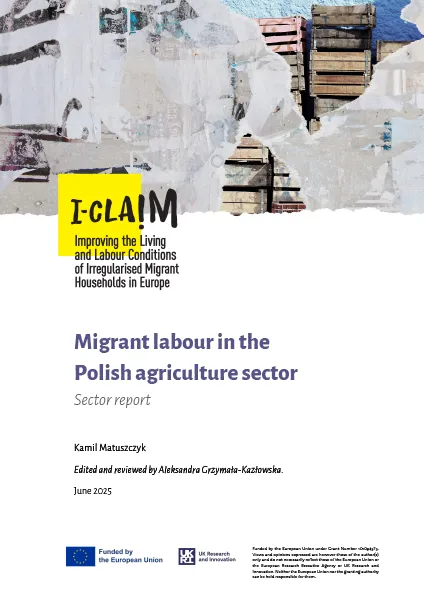Migrant labour in the Polish agriculture sector
Kamil Matuszczyk
How to cite:
Matuszczyk, K. (2025) Migrant labour in the Polish agriculture sector. I-CLAIM. DOI: https://zenodo.org/records/15780736
Migrant labour in the Polish agriculture sector
Kamil Matuszczyk
This report sheds light on the understudied yet vital topic in Poland, due to its scale and significance, of working and living conditions experienced by migrants employed in seasonal fruit and vegetable harvesting. Our study is based on a literature review, interviews with 20 migrant farm workers (actual or with recent experience) and seven interviews with sector-related stakeholders, as well as ethnographic fieldwork, including 22 days of participant observation. All participants were Ukrainian migrants, representing a group that is vastly predominant in the researched agricultural settings. The dominance of females reflects a demographic pattern reinforced by the specificity of the studied jobs, farmers’ preferences, and restrictions concerning male mobility from Ukraine. The gendered aspect of vulnerabilities can be linked to less paid and simpler tasks, as well as less formalised and established positions of Ukrainian women.
The research demonstrated that migrant employment suffers from different forms of irregularity, mostly linked to work without written or registered contracts or actual employment differing from contractual arrangements (e.g., with some undeclared work), as well as residence statuses based on visa-free stays for non-work reasons. The employment irregularity in seasonal agriculture has become widely accepted and normalised due to its long-standing occurrence, the character of farming in Poland, with a dominance of small family farms, low levels of workforce, and profitability in this sector, which coexists with its high essentiality and ideological and political importance. Practically no access to health and social security systems accompanied the described work precarity.
Despite the revealed precarity, the migrant participants did not complain about their working and living conditions in agriculture in Poland. This can be explained by the acceptance of existing conditions due to low expectations, the limited awareness of legal aspects concerning residence, employment, and workers’ rights, accompanied by the lack of support from state or civic society organisations, and vulnerabilities related to temporariness and peripherality. Not complaining about working and living conditions can also be, to some extent, related to the specificity of employer-employee relations (the interviewed migrants worked and lived on small family farms with direct contact and possible co-work with their employers) and recently improving arrangements in agriculture in Poland. The severe shortage of seasonal farm workers has prompted farmers to improve the living conditions and support provided, such as offering better accommodation, transport opportunities, free food, or assistance in the case of accidents or health problems. This may also contribute to the fact that the migrant participants tended to voice more critical remarks about other Ukrainian workers (e.g. harsh ethnic supervisors) rather than their employers or Polish workers (usually performing supervising roles). However, the signs of ethnic stereotyping and paternalism, as well as the difference in the treatment of the war refugees and other Ukrainians, have been found.
It should be highlighted that the aforementioned adaptations have not addressed major issues related to informal and uncertain employment (e.g. work being stopped and not paid due to bad weather), exploitative remuneration based on a piecework system, the employment of children accompanying adult workers and difficult working conditions due to the character of agricultural work.
